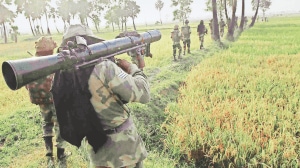In PMs 100-day plan: Food security,rural health cover,extension of job guarantee
Top on Prime Minister Manmohan Singhs 100-day agenda are not big-ticket liberalisation moves,but programmes that benefit the poorest...
Top on Prime Minister Manmohan Singhs 100-day agenda are not big-ticket liberalisation moves,but programmes that benefit the pooresta food security law,tightening of the rural job guarantee scheme to plug leakages,its extension to the urban poor and overhauling the rural health insurance scheme.
According to a government official,financial sector reforms and disinvestment in state-owned companies will be thought through carefully before a decision is taken. For the PM,the more fundamental and immediate issue is food securitywhich must be seen as a Constitutional right. The costs outweigh the psychological benefits such security will create, an official,reflecting Singhs concerns,told The Sunday Express.
The Congress manifesto for the 2009 general elections prom-ised 25 kg of rice or wheat per month at Rs 3 a kg to below-poverty-line households in both rural and urban areas. There are about 300 million poor in India,of which about 81 million are below poverty line. The food subsidy bill for 2009-10 is Rs 42,490 crore and the incremental burden to fulfill the manifesto promise may not be much.
The Prime Minister may not talk in detail about his 100-day agenda in his first address to the nation after being sworn in for a second term. He will,however,take credit for the UPA Governments deft handling of the global economic crisis and its impact on India. He will simultaneously pledge to restore the economy to the high growth path of 9 per cent plus in the coming years.
Singh will address the people through a televised speech on the state-run Doordarshan in the next three-four days,said an official in the Prime Ministers Office. It will be recorded shortly, said the official,without giving more details.
Though the Prime Minister will not get into specifics,officials said he would set a 4 per cent growth rate as target for agriculture and a double-digit growth rate for manufacturing, with special focus on exports. While manufacturing slumped last year and is estimated to grow just 4.1 per cent,agriculture is estimated to grow 2.6 per cent in 2008-09,according to the Central Statistical Organisation advance estimates released in February.
Top government officials said to revive agriculture,the Prime Minister is keen on farmers getting a good price for their produce. This will mean that the government may not shy away from increasing the minimum support price for wheat,rice and some other agricultural commodities.
Since 2003-04,the MSP for paddy has been raised to Rs 900 per quintal from Rs 550 and that for wheat to Rs 1,080 a quintal from Rs 630. Significantly,the officials said,the UPA government would pump more funds into the public sector,especially in the infrastructure sectors. The Prime Minister is keen that the government expenditure in sectors such as roads,shipping,railways and irrigation projects goes up substantially. This will help generate more employment, said an official. The UPA believes that it is for the government to protect and create additional jobs during times of a slowdown. For this,public investment in infrastructure is the only alternative,more so when the private sector is holding back its plans, the official said.



- 01
- 02
- 03
- 04
- 05




























